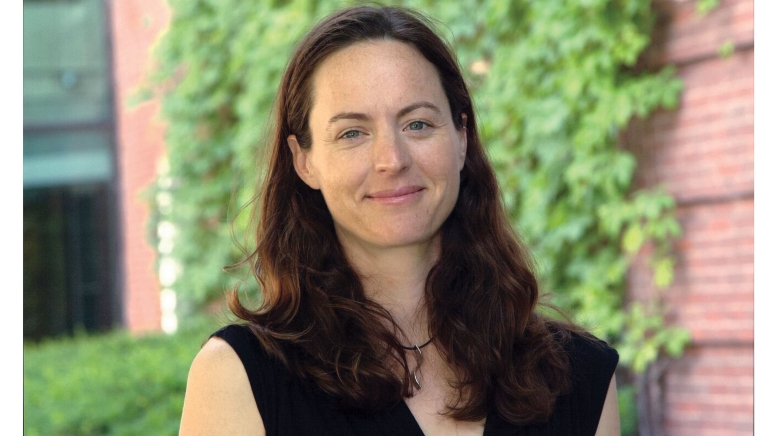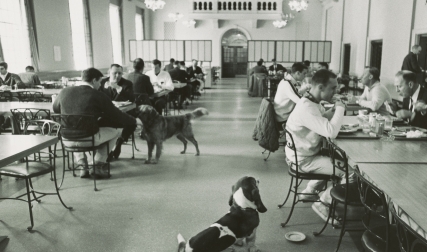How has student awareness of sustainability issues evolved since you were an undergrad?
In the last five or eight years, there’s been massive momentum toward action on climate change and what I would define as “modern sustainability,” thinking about Dartmouth’s physical operation as an expression of our mission. Many more students now arrive with an awareness that this is a thing they want to work on.
What do you mean by modern sustainability?
Sustainability is traditionally defined as using resources in a way that allows you to use them indefinitely into the future. Modern sustainability is more than that. It’s thinking about our environmental impacts as part of a holistic system so we can come up with interesting ways to reduce our environmental impacts and create positive impacts at the same time. It’s solution-oriented as opposed to problem-oriented, more about “how could we live better?”
What is the biggest sustainability win your office has achieved?
It’s the students who have come through here who are now off doing amazing things. The student who wasn’t interested in sustainability at all, then walked into our office as a junior and was fired up about a particular project, got into it, and now is doing sustainability consulting. Or the student who went on our alternative spring break trip to West Virginia, became passionate about how the political process was impacting sustainability, and 10 years later told me the trip was the most impactful thing he ever did.
What about changes you’ve pushed through to make the College more eco-friendly?
Our greenhouse gas emissions have declined 30 percent in the last six years. That feels like a big accomplishment. But I care much more about the students who walk through our doors.
What slice of the student body gets involved with your programs?
About 1,700 students a year do something with our office. I would say 200 to 300 students each year are deeply engaged in sustainability programming. Probably 50 of them would say, “This is my No. 1 thing I do at Dartmouth.”
In 2017 you published a “goals and progress” report for Dartmouth. Is that still a guiding framework?
Yes, and one of the things we committed to in that report was to revise our recommendations every five years. We’re doing that now.
Can you give an example of what’s being revised?
My original goal was to take three years to decommission the central power plant and radically reduce our carbon emissions. I’m in year 12, and we still are producing a lot of carbon emissions. I thought we could move a lot faster and more audaciously on emissions reduction than we have.
I thought we could move a lot faster and more audaciously on emissions reduction than we have.
You were a proponent of the now-scrapped plan to replace fuel oil at Dartmouth with a wood-burning biomass plant. What happened?
It didn’t move forward mainly because of a major global scientific report that stated, “The next five to 10 years are critical for climate.” Burning woody biomass would produce a lot of emissions in the next five to 10 years. So even if it’s carbon neutral over 100 years, that doesn’t help if you’re worried about the next five to 10 years. That was the thing that changed my mind. We had to follow the science, which was telling us that cutting emissions needs to happen faster.
So what now instead of biomass?
The direction we are going now is electrifying our heating and cooling system and entirely moving away from combustion, which unavoidably produces emissions.
What’s another goal you’d like to move faster on?
I would like Dartmouth to be a zero-waste campus. We should not buy anything that you have to recycle. We should only buy bioplastics and stuff that rots. That means, for example, convincing dining services to no longer use plastic Saran Wrap and instead use bioplastic Saran Wrap, which doesn’t work quite as well. Now imagine that times $150 million worth of objects.
Why hasn’t Dartmouth’s annual waste footprint changed much in recent years?
Our lack of success in diverting waste from landfills and reducing our overall waste is a microcosm of what is happening in the broader world. The waste system in the United States is broken. Recycling is difficult and expensive. People care about recycling, but they struggle—or don’t bother—to sort recyclables from trash because it’s confusing or inconvenient. And that can cause contamination. That’s true nationally and at Dartmouth.
What’s the hardest part of your job?
It takes a long time to get stuff done. I would love to be the grand wizard and have all the leadership decisions happen in favor of sustainability. Part of what is fun about my job, which is also the thing I hate, is that I don’t control everything. Our office is poor, powerless, and feisty. I have to figure out how to convince people to do things even when I don’t exert any particular power or influence over those things. That’s a fun puzzle, but it takes a long time.
Are there any college campuses that Dartmouth should emulate?
I have colleagues at all our peer institutions who are doing incredible work. But no place is doing everything well because sustainability is difficult and multifaceted and systemic.
If you were a grand wizard and could change one thing overnight, what would it be?
It actually wouldn’t be Dartmouth’s carbon emissions, which I’m happy to work on for the rest of my career. But the sadness and pessimism that people feel right now—most students think the world is going to hell in a handbasket—I would wave my magic wand and turn that into optimism and action.




